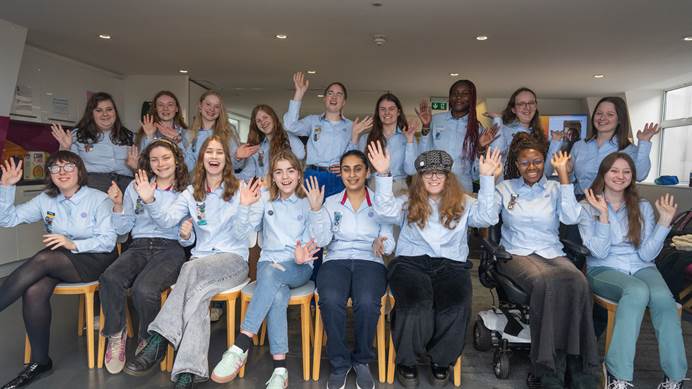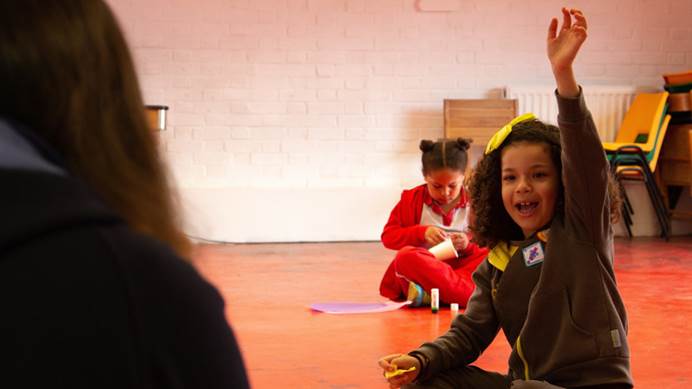How to organise a unit meeting with a decision maker
Invite a councillor, MP or another decision maker to your unit
A decision maker visiting a unit meeting is a great way to engage young members with democracy and help them learn how the UK is run.
Decision makers, or representatives, are elected to make decisions. Representatives include Members of Parliament (MPs), Members of the Scottish Parliament (MSPs), Members of the Welsh Parliament (MSs), Members of the Legislative Assembly in Northern Ireland (MLAs), and local councillors.
There isn’t a functioning government in Northern Ireland at the moment but you can invite your local councillor or MP.
This is how to invite a decision maker, keep your girls safe, and ideas on what to do during the meeting.
Carmel, a leader at 6th Greenford Guides, has invited decision makers to her unit and has lots of tips.
‘We have had both our MP and councillors visit our unit usually for UK Parliament Week, which is great hook to get them interested,’ she says. UK Parliament Week happens every November that spreads the word about what Parliament is, what it does and how people can get involved.
‘Give them some time to speak and a theme for the talk,’ Carmel adds. ‘This year we had a female councillor, Aysha Raza, who is also a woman working in a STEM role. She was tasked to talk about her journey and the role she has in the council, Cabinet Member for Tackling Inequality. It was great and the girls asked lots of questions.’
Meeting a decision maker at a community event and giving them your details, such as a phone number or your unit’s email address is a good way to invite someone to your meeting. MPs’ and councillors’ contact details are publicly available too, and you could get in contact that way. Go to TheyWorkForYou to find out your area’s MP, MSP, Members of the Welsh Parliament, MLA and MS. And search on your council’s website to find your local councillor.
Once you and the decision maker have decided on a date to visit your unit, follow the external visitors checklist on our visitors to your meeting webpage. This includes making sure the decision maker fills out and returns the external visitors agreement form. And when they’re at the meeting, make sure they’re never alone with members, and that they follow photo permissions.
They might want to talk to members, like Aysha did at Carmel’s meeting, but organising an activity as well is a great way to keep the energy up and start discussing big ideas.
‘This year the girls did a debate led by our young leaders,’ says Carmel. ‘The theme was “young people should not access social media until 16”. We thought the “againsts” would have difficulty, but their arguments were really convincing, and it became clear that some of them had already been exposed to some forms of cyberbullying. You can learn a lot that you did not expect.
‘Aysha spent most of the meeting with us and had a great discussion with the girls. We also did a young leader’s promise celebration at the end of the meeting rounded it of in a real guiding way.’
As a charity, it’s important Girlguiding remains independent and doesn’t give support or funding to a political party, candidate or politician.
Want to do an activity when a decision makers visit your meeting? Here are some ideas for each section:
Rainbows
- Nature neighbours, pack 4: a unit meeting activity encouraging the community to value local wildlife.
- Shape the future, an adventures at home activity: find out who your MP is, where to find them and write to them.
- Rainbow department of small change, a UK Parliament Week activity: unit meeting activity that helps Rainbows see what change they can make in their community.
Brownies
- Super Brownies, pack 2: Brownies take on a mission to make their local area a better place to live.
- Shape the future, an adventures at home activity: find out who your MP is, where to find them and write to them.
- Listen up!, a UK Parliament Week activity: a unit meeting activity to help Brownies find out more about Parliament and host their very own parliamentary debate.
- Beat the butterflies, communicate stage 3: learn about public speaking
- Make my voice louder, communicate stage 3: all about protesting and creating pressure groups.
Guides
- Architects for action, pack 1: what’s missing in your local area? How can Guides help improve local needs?
- Treasury takeover, pack 4: understand how the Government handles money.
- Shape the future, an adventures at home activity: find out who your MP is, where to find them and write to them.
- Why, why, why, a UK Parliament Week activity: In this unit meeting activity, Guides can decide on something they want to change in the world and see if they can defend your idea in their very own question time.
- Beat the butterflies, communicate stage 3: learn about public speaking
- Make my voice louder, communicate stage 3: all about protesting and creating pressure groups.
Rangers
- Action plan, pack 1: discuss how to improve communities.
- Creative communities, pack 2: create a project and pitch it to an MP.
- Our choices, our voices, pack 4: all about challenging decision makers.
- Shape the future, an adventures at home activity: find out who your MP is, where to find them and write to them.
- Just one more moment, a UK Parliament Week activity: in this unit meeting activity, see if Rangers can lobby their peers to believe in their cause above all others.
If you need some more ideas, or want to learn more about the different roles decision makers could have, read Unicef’s engaging political decision makers PDF.
And, most importantly, have fun! If you want to share your story with us, email [email protected].
Top tips
- Get in touch with your decision maker with a formal invitation as soon as you can and give time for a reply – they’re often very busy.
- In your invitation, give information about your unit, Girlguiding, your interests and why young members would like them to visit.
- About a week before the visit, send any information or instructions, like timings, location and a short agenda.
- Spend time with young members preparing for the visit – what questions they might ask for example. These could be about their role or why they got into politics.
Have you invited a decision maker to your unit? Tell us all about it by emailing [email protected].



